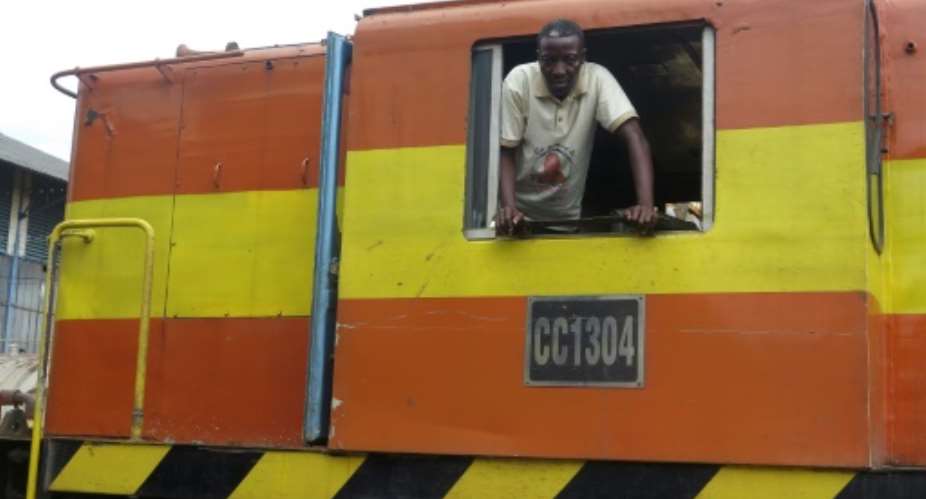Cotonou (AFP) - Hundreds of workers sit between out-of-date machinery and old carriages in the main workshop of Benin's struggling state rail firm for their last staff meeting as public sector employees.
On Wednesday, the OCBN becomes Benirail, a new public-private partnership between the Benin and Niger governments, investors from both countries and the French industrial giant Bollore.
The countries' prime ministers and the Bollore group in August signed a 30-year deal to construct and run the rail line between Benin's financial hub Cotonou and Niger's capital, Niamey.
The line makes up a third of the 3,000 kilometres (1,860 miles) of an ambitious project to link Cotonou with Abidjan via Niger, Burkina Faso and Togo and costing some 2.5 billion euros, $2.85 billion), Bollore told French media in August.
In doing so, it's hoped it will kickstart growth in five of the world's poorest countries and wider West Africa.
- Full steam ahead? -
Last month, Bollore, which holds 40 percent of Benirail, paid 19 months in salary arrears to 629 OCBN workers as well as to hundreds of retired railwaymen.
"It was like a dream. When I went to the bank, they told me the money was there," said Gilbert-Leonard Aidofi, head of rolling stock, who has worked for the OCBN for 20 years.
Train driver Benoit Gandaho said lack of financial resources meant he had to send his family back to his village 140 kilometres from Cotonou.
"I was sleeping in the sheds," he said. "Now I'm renting (a house) and I've brought them back. Bollore's arrival has changed my way of life."
Joseph Adjanohoun, who has also driven trains for the last 20 years, still proudly wears his khaki uniform but said he was pleased conditions were changing.
"We're all ready to get down to work," he said.
Bollore has transferred the jobs of all 629 railway workers, despite the lack of activity on the tracks.
The last passenger train in Benin ran in December 2005. Freight still operates but the OCBN has been struggling for the last decade.
"Bad management, ageing equipment, competition from road transport. The states abandoned the railways," said union chief Arsene Adjovi.
- Major assets -
The railways came to Benin, then called Dahomey, in 1936.
The forerunner of the OCBN, the OCDN, was launched in 1959 -- a year before independence from France -- but stopped at the border, at Parakou, 438 kilometres north of Cotonou.
A Benin businessman, Samuel Dossou, then won the tender to own 20 percent of Benirail.
In 2013, Bollore, which was operating in Benin's main port in Cotonou, emerged as a major contender. An agreement was signed to create a new company with a capital of 70 billion CFA francs.
In the workshop, the railwaymen praise Benin's President Thomas Boni Yayi and Niger's President Mahamadou Issoufou for having asked for and secured their backpay.
In reality the payment is an advance that the two countries will have to pay back to Bollore under an agreement finalised earlier this month in Paris.
"We have undertaken to pay within two months 10 percent of the capital and the back pay," said Gustave Depo Sonon, Benin's minister of transport and public works.
"We had envisaged compensation but we have to first evaluate financial and property assets."
The OCBN, which was formally wound up in March, has major assets and has been living off the rent for the last 10 years.
The Bollore group itself estimates the holdings are worth 22 billion CFA francs.
Niger's transport minister Saley Saidou, in Cotonou for a meeting of the body heading up the assessment of assets, said that is yet to be confirmed, as has what transfers to the new company.
- All change -
The railway workers, most of them in their mid-40s, are aware everything will change with private ownership.
"When the rhythm of the drum changes, the tempo changes too. But railwaymen are ready for a fight. We're going to double our efforts," said Benoit Gandaho.
Arsene Adjovi added: "It's a new company with its own rules and we're going to respect that. We will do everything not to disappoint our employer. They shouldn't disappoint us."
Bollore is expected to comment in the coming days.
In the meantime, they are counting on the railwaymen, promising training for future projects.
From early 2016, the first trains should be running on the coastal route, linking 45 kilometres between Seme, on the border with Nigeria to the east, Cotonou and Pahou, to the west.





 Akufo-Addo commissions Phase II of Kaleo solar power plant
Akufo-Addo commissions Phase II of Kaleo solar power plant
 NDC panics over Bawumia’s visit to Pope Francis
NDC panics over Bawumia’s visit to Pope Francis
 EC blasts Mahama over “false” claims on recruitment of Returning Officers
EC blasts Mahama over “false” claims on recruitment of Returning Officers
 Lands Minister gives ultimatum to Future Global Resources to revamp Prestea/Bogo...
Lands Minister gives ultimatum to Future Global Resources to revamp Prestea/Bogo...
 Wa Naa appeals to Akufo-Addo to audit state lands in Wa
Wa Naa appeals to Akufo-Addo to audit state lands in Wa
 Prof Opoku-Agyemang misunderstood Bawumia’s ‘driver mate’ analogy – Miracles Abo...
Prof Opoku-Agyemang misunderstood Bawumia’s ‘driver mate’ analogy – Miracles Abo...
 EU confident Ghana will not sign Anti-LGBTQI Bill
EU confident Ghana will not sign Anti-LGBTQI Bill
 Suspend implementation of Planting for Food and Jobs for 2024 - Stakeholders
Suspend implementation of Planting for Food and Jobs for 2024 - Stakeholders
 Tema West Municipal Assembly gets Ghana's First Female Aircraft Marshaller as ne...
Tema West Municipal Assembly gets Ghana's First Female Aircraft Marshaller as ne...
 Dumsor is affecting us double, release timetable – Disability Federation to ECG
Dumsor is affecting us double, release timetable – Disability Federation to ECG
